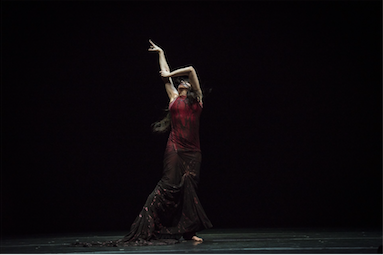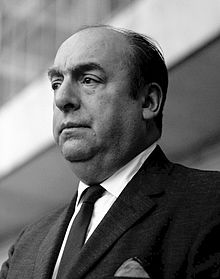 It is common knowledge that numbers are omnipresent and one ends up encountering them where least expected. This happened to me a few days ago, when I attended the show that the bailaora María Pagés has prepared for the recently concluded Seville Flamenco Biennial.
It is common knowledge that numbers are omnipresent and one ends up encountering them where least expected. This happened to me a few days ago, when I attended the show that the bailaora María Pagés has prepared for the recently concluded Seville Flamenco Biennial.
The show is entitled Una oda al tiempo (An ode to time), and it has the sensitivity, emotion and passion with which this magnificent artist from Seville permeates her creations. In addition, it is intellectually elevated and charged with social and political concern. «Una oda al tiempo», we read in the presentation of the show, “is a flamenco choreography about contemporaneity and the necessary dialogue with memory”; and, I add, not only from flamenco, because María besides dancing to the sound of soleás de Triana and de la Serneta, seguiriyas de los Puertos, cantes de Trilla, tonás, alboreás, peteneras or alegrías de Córdoba, also dances to the rhythms of Stravinsky, Tchaikovsky, Vivaldi or Händel. The show “is an allegory about the times we live in”, I continue quoting from the text of its presentation, “with its possibilities of happiness, utopias, terrorism, attacks on equality, setbacks to democracy… Ideas from Plato, Marguerite Yourcenar, Jorge Luis Borges, Pablo Neruda… run through its sap, united by a profound investigation into the ontology of the work of art”.
 The fourth scene of the show, a bulerías dance entitled Cuéntame el tiempo, revolves around a poem by Neruda, entitled Oda a los números (Ode to numbers). The very title of the scene plays with the double meaning of “count”: “to number or compute things, considering them as homogeneous units”, and “to refer to an event, whether true or fabulous”. In the life journey proposed in this creation by María Pagés, this scene corresponds to the passage from childhood to early youth, and suggests a somewhat rowdy school where some young people study mathematics – numbers, to be more precise. The treatment is deeply respectful of numbers, and it is comforting for a mathematician to see how the subject of numbers is integrated to perfection in a complex work, which appeals primarily to the emotions conveyed by dance and music, but which does not renounce an intellectual transcendence in which the teaching of numbers is integrated to perfection.
The fourth scene of the show, a bulerías dance entitled Cuéntame el tiempo, revolves around a poem by Neruda, entitled Oda a los números (Ode to numbers). The very title of the scene plays with the double meaning of “count”: “to number or compute things, considering them as homogeneous units”, and “to refer to an event, whether true or fabulous”. In the life journey proposed in this creation by María Pagés, this scene corresponds to the passage from childhood to early youth, and suggests a somewhat rowdy school where some young people study mathematics – numbers, to be more precise. The treatment is deeply respectful of numbers, and it is comforting for a mathematician to see how the subject of numbers is integrated to perfection in a complex work, which appeals primarily to the emotions conveyed by dance and music, but which does not renounce an intellectual transcendence in which the teaching of numbers is integrated to perfection.
 As far as I know, Neruda has two magnificent poems dedicated to numbers. One is Ode to numbers, which María Pagés uses to structure her scene, and the other is Una mano hizo el número (A hand made the number, in which Neruda was so inspired to establish the original link between number and the human hand, and about which I have written in several of my books). I reproduce them below, and leave one last piece of advice: if you have the opportunity, don’t miss that prodigious creation, Una oda al tiempo by María Pagés.
As far as I know, Neruda has two magnificent poems dedicated to numbers. One is Ode to numbers, which María Pagés uses to structure her scene, and the other is Una mano hizo el número (A hand made the number, in which Neruda was so inspired to establish the original link between number and the human hand, and about which I have written in several of my books). I reproduce them below, and leave one last piece of advice: if you have the opportunity, don’t miss that prodigious creation, Una oda al tiempo by María Pagés.
Ode to numbers (Pablo Neruda, in Elemental Odes, 1954)
Oh, the thirst to know
how many!
The hunger
to know
how many
stars in the sky!
–
We spent
our childhood counting
stones and plants, fingers and
toes, grains of sand, and teeth,
our youth was past counting
petals and comets’ tails.
We counted
colors, years,
lives, and kisses;
in the country,
oxen; by the sea,
the waves. Ships
became proliferating ciphers.
Numbers multiplied.
The cities
were thousands, millions,
wheat hundreds
of units that held
within them smaller numbers,
smaller than a single grain.
Time became a number.
Light was numbered
and no matter how it raced with sound
its velocity was 37.
Numbers surrounded us.
When we closed the door
at night, exhausted,
an 800 slipped
beneath the door
and crept with us into bed,
and in our dreams
4000s and 77s
pounded at our foreheads
with hammers and tongs.
5s
added to 5s
until they sank into the sea of madness,
until the sun greeted us with its zero
and we went running
to the office,
to the workshop,
to the factory,
to begin again the infinite
1 of each new day.
–
We had time, as men,
for our thirst slowly
to be sated,
the ancestral desire
to give things a number,
to add them up,
to reduce them
to powder,
wastelands of numbers.
We
papered the world
with numbers and names,
but
things survived,
they fled
from numbers,
went mad in their quantities,
evaporated,
leaving
an odor or a memory,
leaving the numbers empty.
–
That’s why
for you
I want things.
Let numbers
go to jail,
let them march
in perfect columns
procreating
until they give the sum
total of infinity.
For you I want only
for the numbers
along the road
to protect you
and for you to protect them.
May the weekly figure of your salary
expand until it spans your chest.
And from the 2 of you, embraced,
your body and that of your beloved,
may pairs of children’s eyes be born
that will count again
the ancient stars
and countless
heads of grain
that will cover a transformed earth.
A hand made the number (Pablo Neruda, in The Hands of the Day, 1968)
28325674549
A hand made the number.
It joined one little stone
to another, one thunderclap
to another,
one fallen eagle
to another, one
arrowhead to another,
and then with the patience of granite
the hand
made a double incision, two wounds,
and two grooves: and a
number was born.
Then came the numeral two, then
a four;
one hand kept making
them all –
the five, the six,
the seven,
the eight, the nine – zeroes
like bird’s eggs.
unbreakable,
solid
as rock
printing the numbers
without wearing away, and inside
that number, another,
and another inside that other,
teeming, inimical,
prolific, acerb
counting
and spawning,
filling mountains, intestines,
gardens, and cellars,
falling from books,
flying over Kansas, Morelia,
blinding us, killing us, covering all:
out of wallets, off tables:
the numbers, the numbers,
the numbers.
(Translated by Ben Belitt)
References:
Antonio J. Durán, El ojo de Shiva, el sueño de Mahoma, Simbad… y los números, Destino, Barcelona, 2012.
Antonio J. Durán, Crónicas matemáticas, Crítica, Barcelona, 2018.

Leave a Reply